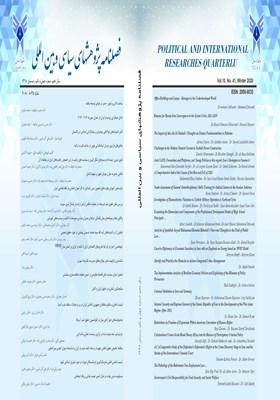مطالعه تطبیقی حقوق دفاعی متهم در مرحله کشف جرم در ایران و اساسنامه دیوان کیفری بین المللی
محورهای موضوعی : مجله پژوهش های سیاسی و بین المللی
کلید واژه: کشف جرم, حقوق دفاعی متهم, قانون آئین دادرسی کیفری مصوب 1392, اساسنامه دیوان دائمی بین المللی کیفری,
چکیده مقاله :
قاسم کرباس فروش[1]- اکبر وروایی[2] تاریخ دریافت: 25/7/1398- تاریخ پذیرش: 26/10/1398 چکیده با ایراد اتهام به شخص متهم، مشارالیه وارد فرآیندی از دادرسی کیفری می شود که یک طرف آن حکومت با تمام اختیارات و امکانات قرار دارد تا در برابر متهم بایستد و در طرف دیگر متهمی قرار دارد که در برابر قوای حکومتی ناتوان است در نتیجه باید به متهم این امکان داده شود تا به نحو مطلوب از خود دفاع کند. اگر سازوکاری اندیشیده نشود در واقع ستمی به ناحق به مشارالیه وارد میآید؛ برای ممانعت از این وضع، بایستی متهم از حقوق دفاعی مناسبی برخوردار باشد. مرحله کشف جرم به عنوان نخستین مرحله از فرآیند رسیدگی جرم از اهمیت ویژه ای برخوردار می باشد و تا حدود زیادی سرنوشت نهایی پرونده کیفری به این مرحله وابسته می باشد. بر این اساس عدم توجه به اصول دادرسی عادلانه و منصفانه به ویژه تضمین حقوق دفاعی متهم در مرحله کشف جرم می تواند سایر مراحل دادرسی کیفری را تحت تاثیر قرار دهد. معمولاً مقررات مربوط به حقوق متهم در قانون آیین دادرسی کیفری آورده میشود و در همه رسیدگی های کیفری مرعی می گردد. آیین دادرسی کیفری ایران نیز، در مواد مختلفی به حقوق دفاعی متهم پرداخته است؛ نظیر: حق آزادی، حق تفهیم اتهام، حق داشتن وکیل، لزوم حیثیت و کرامت انسانی و ... همچنین برای عدم رعایت این حقوق توسط سیستم رسیدگی کننده اعم از مقامات قضایی و پلیسی، ضمانت اجراهای کیفری در نظر گرفته شده است. [1] - دانشجوی دکتری، حقوق جزا و جرم شناسی، واحد کرمانشاه، دانشگاه آزاد اسلامی، کرمانشاه، ایران؛ گروه جزا و جرم شناسی، واحد علوم و تحقیقات کرمانشاه، دانشگاه آزاد اسلامی، کرمانشاه، ایران gasem.karbasforosh@gmail.com [2] - استاد و عضو هیات علمی، دانشگاه علوم انتظامی امین، تهران، ایران : نویسنده مسئول akbarvarayi@iran.ir
GHasem Karbas Forosh[1] Akbar Vorvayi[2] Abstract On charges against the accused, aforementioned enters a process of criminal prosecution where one side of the government has all the powers and means to stand up to the accused and the other is accused of being incapable of governing. Defendant have to allow to defend itself optimally. If the mechanism is not thought out, the wrongdoing will inevitably lead to misconduct; to avoid this, the defendant must have adequate defense rights. The discovery phase of the crime as a first step in the criminal investigation process is of particular importance and to a large extent the ultimate fate of the criminal case depends on this stage. Accordingly, failure to adhere to the principles of fair and equitable proceedings, in particular the safeguarding of the defendant's defense at the discovery stage of the crime, may affect other stages of the criminal proceedings. Usually, the provisions on the rights of the accused are enshrined in the Code of Criminal Procedure and are superseded in all criminal proceedings. The Criminal Procedure Code of Iran has also dealt with various aspects of defendant's defense rights, such as: the right to liberty, the right to be accused, the right to have a lawyer, the need for dignity and human dignity, and so on for the violation of these rights by the criminal justice system. Police and judicial authorities have guaranteed criminal prosecution. [1] - PhD student, Criminal Law and Criminology, Kermanshah Branch, Islamic Azad University, Kermanshah, Iran Department of Criminology and Criminology, Kermanshah Branch of Science and Research, Islamic Azad University, Kermanshah Iran. Gasem.karbasforosh@gmail.com [2] - Full Professor and Faculty Member, Amin Police Science University, Tehran, Iran
_||_

